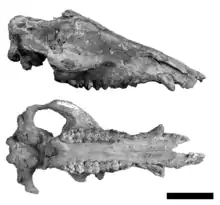Nyanzachoerus
Nyanzachoerus is an extinct genus of the pig family (Suidae) belonging to the subfamily Tetraconodontinae. The several species of Nyanzachoerus lived in Africa from the Miocene to Pliocene.[1][2]
| Nyanzachoerus Temporal range: | |
|---|---|
 | |
| Nyanzachoerus khinzir skull in lateral and ventral view | |
| Scientific classification | |
| Domain: | Eukaryota |
| Kingdom: | Animalia |
| Phylum: | Chordata |
| Class: | Mammalia |
| Order: | Artiodactyla |
| Family: | Suidae |
| Subfamily: | †Tetraconodontinae |
| Genus: | †Nyanzachoerus Leakey, 1958 |
| Type species | |
| †Nyanzachoerus syrticus | |
| Species | |
| |
Description
This was a large pig-like creature, larger than living species.
Fossils of males of these species show that they had large lumps on their muzzle and widely flaring cheekbones. Their tusks were only of moderate size. It can be assumed that the ornaments were used as a mating display.
Species
A total of 11 species have been described.[3]
- N. syrticus, Leonardi 1952
- N. kanamensis, Leakey 1958
- N. devauxi, Arambourg 1968
- N. jaegeri, Coppens 1971
- N. waylandi, Cooke and Coryndon 1970
- N. pattersoni, Cooke and Ewer 1972
- N. tulotos, Cooke and Ewer 1972
- N. plicatus, Cooke and Ewer 1972
- N. australis, Cooke and Hendey 1992
- N. khinzir, Boisserie, Souron, Mackaye, Likius, Vignaud and Brunet, 2014
- N. nakaliensis, Tsubamoto et al., 2020
References
- National Geographic Prehistoric Mammals, Alan Turner, 2004
- Boisserie, Jean-Renaud; Souron, Antoine; Mackaye, Hassane Taïsso; Likius, Andossa; Vignaud, Patrick; Brunet, Michel (2014). "A New Species of Nyanzachoerus (Cetartiodactyla: Suidae) from the Late Miocene Toros-Ménalla, Chad, Central Africa". PLOS ONE. 9 (8): e103221. Bibcode:2014PLoSO...9j3221B. doi:10.1371/journal.pone.0103221. PMC 4146473. PMID 25162699.
- "MammalPaleontology : Message: Nyanzachoerus - A Pig of the Miocene and Pliocene". tech.dir.groups.yahoo.com. Archived from the original on 21 July 2012. Retrieved 6 June 2022.
This article is issued from Wikipedia. The text is licensed under Creative Commons - Attribution - Sharealike. Additional terms may apply for the media files.